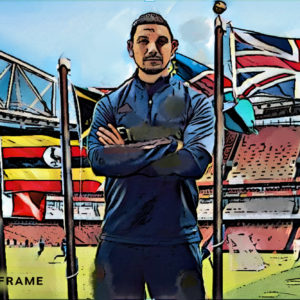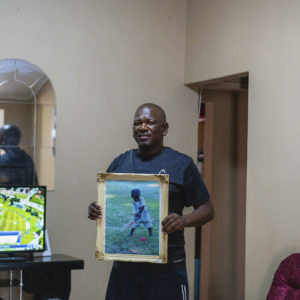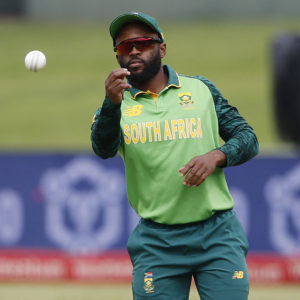Neil Wagner has no doubts about being a proud Kiwi
The Pretoria native went to New Zealand after struggling to gain a foothold in domestic cricket. Though adapting meant learning some hard lessons, he could not be happier these days.
Author:
16 February 2022

At the last count in 2020, there were roughly 870 000 South African expats around the world, according to the data analytics company Statista. Most have resettled in the United Kingdom, Australia and the United States, forging new paths for themselves and their families in relative anonymity. The majority are able to remain culturally and psychologically tethered to the country of their birth. “Home” might represent two different places.
Professional athletes rarely have the luxury of holding dual national identities. Those who compete for a country in which they were not born are obliged to declare their unwavering allegiance one way or the other. “If you want to give your all for your team, you have to sever all emotional ties with your old country,” says Neil Wagner, the Pretoria-born fast bowler who has played a telling role in a golden era of New Zealand cricket.
“You can’t have one foot in a different camp. You have to be fully immersed. A lot of people don’t ever have to face that fork in the road. When they go to work they don’t have a country’s flag on their chest. They don’t sing that country’s anthem before they start their day. We do. And I’ve learnt that if I wanted to realise my potential and play my part in helping New Zealand win cricket matches, I had to cut the cord connecting me to South Africa.”
Related article:
It wasn’t easy. Wagner attended Afrikaanse Hoër Seunskool, colloquially known as Affies, in Pretoria. In this breeding ground where athletic ambitions are cultivated to fruition, he shared a field with future Proteas AB de Villiers, Faf du Plessis and Heino Kuhn. He grew up idolising Allan Donald and his quintessentially South African bravado.
“He was my hero,” Wagner says. “I’d copy everything he did. He gave me a blueprint of how to play cricket. He embodied so much of what it meant to be South African for me.”
After making his first-class debut for Northerns in 2005, Wagner toured Bangladesh and Zimbabwe with a national academy team in 2007. He was on track to realise his lifelong dream of playing cricket for his country.
“When you’re young, you think you’re the next best thing,” he admits. “Sometimes that’s a weapon because you go into the contest with confidence, which is key for any fast bowler. But it can work against you. You become blind to your shortcomings and can blame other people if things don’t go your way.”
Facing reality
When Wagner first looked for greener pastures in 2008 – in England and Wales’ County Championship – he publicly lamented South Africa’s “quota system” that sought to rectify historical imbalances by providing opportunities for Black players. In the 14 years since, he has altered his position.
“I was never going to break into the Titans, let alone the Proteas,” he says. “They had Albie and Morne Morkel, André Nel and Dale Steyn. That’s a quality attack. When I looked at the other teams and the guys playing for South Africa, I now know that I wasn’t going to challenge them. I started to get disappointed when I was promised contracts but they weren’t delivered. Thinking emotionally about things, you don’t think smartly and you speak out of turn. The anger and emotion take over. I needed a change in my life.”
He had reached a ceiling of sorts. Despite finishing as the highest wicket-taker in the 2006-2007 Provincial Challenge, he was unable to gain a foothold with his franchise. It was then that he received a lifeline from Mike Hesson, a future head coach of New Zealand who was running things in Dunedin with Otago.
Related article:
Wagner jumped at the opportunity. He had fostered a love for New Zealand sport ever since the Crusaders rugby team used his school’s fields as a training base ahead of their 2003 Super 14 match against the Bulls. Flyhalf Andrew Mehrtens was especially friendly and even made a point of greeting Wagner and his mates after his team’s 32-31 loss at Loftus Versfeld. “That stuck with me,” Wagner says. “I remember thinking he’s a bloody good guy. It made me believe that everyone in New Zealand was just decent.”
Wagner signed a six-month contract with Otago for half the money that was tabled by English county sides Hampshire and Sussex. And though he had all the necessary raw ingredients, a mental recalibration was required to succeed in his new environment.
A humbling reception
In his first match in New Zealand, he stood at the top of his mark with the new ball in his hand. His mind was focused on the dangerous things he was about to do to the batter’s body and stumps. With his chest pushed out and his face red with hot blood, he sought to intimidate not only with a barrage of bouncers, but with a torrent of verbal abuse as well.
“I grew up believing that this was the way things were done,” he says. “In South Africa, from club cricket right through to franchise cricket, fast bowlers are supposed to be mean and scary. It’s expected that you give the batsman an earful and get in his face.”
Wagner’s actions seemed vindicated as he bagged a wicket in his first over. He’d get another one as Otago bowled Northern Districts out for 275. When it was his chance to bat, he noticed Trent Boult, one of the most successful bowlers in New Zealand history, mocking his overt machismo.
Related article:
“He was throwing his arms in the air and mimicking me,” says Wagner. “He was getting a few laughs from his teammates. It made me feel a little silly. When he nicked me off soon after he did it again. We joke about it now because we’re good mates, but that stayed with me. I know a few guys didn’t like me when I first arrived. They’ve told me so and I’ve been humbled by the experience. I thought I’d play for New Zealand by doing things my way. Things don’t work like that here. I had to adapt. I had to understand that it was on me to change.”
Though he softened slightly, his appetite for wickets remained. He claimed 21 in his first season and 28 in his second. In his third he topped the wicket-taking charts with a haul of 51 at just 18.15 runs apiece, including a match-winning 10/110 against Auckland. When he ended the 2011-2012 campaign as the top wicket-taker for the second season in a row, a Test debut was all but assured.
Finding his niche
He became Black Cap number 256 in July 2012 against the West Indies. He found the transition difficult at first. He’s never been particularly quick, not by Test standards at least. And he’s not a tall man. Beyond his left arm there is very little to differentiate him from his domestic peers. After taking 40 wickets in his first 12 Tests at an average of 37 it seemed as if he’d reached another ceiling.
“I looked at Trent and Tim [Southee] and knew I didn’t have their skills,” Wagner says about New Zealand’s immovable ball bowlers. “So I needed to find something that would give me a point of difference. Otherwise I’d be struggling to stay in the team.”
It came by chance as much as conscious thought. Against India in Auckland in 2014, Wagner ripped eight wickets in a 40-run win. Six of them were procured with a short ball. From there, the stocky Pretoria native had found his niche.
Related article:
He is now synonymous with the bouncer. No other fast bowler in world cricket bowls it as often or with as much efficacy as Wagner. Since his heroics against India, he has averaged 24.7 and taken 188 wickets. Almost 60% of them have come courtesy of the short stuff, 15% more than anyone else. He’s also become one of the most potent seamers with the old ball, allowing New Zealand’s attack to keep the pressure up even after Boult and Southee have tired.
“I’d give anything to contribute to New Zealand cricket,” he says with the unmistakable flatness of the New Zealand accent. “This country has welcomed me with open arms and given me the life and the opportunities that I’ve had. I’ll always be grateful and will do whatever I can to pay that back.”
Owning who he is
Underlining his commitment to the cause, he bowled 49 overs across two innings with two broken toes against Pakistan in December 2020. Sitting out was never an option. Instead he charged to the wicket like a zealot, testing the limit of the two bouncers per over allotted in Test cricket. As Pakistan clung on for a draw, Wagner removed centurion Fawad Alam and later Faheem Ashraf as his team secured an innings victory.
Six months later Wagner was a world champion. New Zealand’s eight-wicket win over India at Lord’s in the World Test Championship final was the crowning moment in a career that might have faded into obscurity had he stayed in South Africa’s domestic system.
Related article:
He’s copped his fair share of criticism as a result. School friends blocked him on Facebook and deleted him from WhatsApp groups when he qualified for New Zealand. He was branded a traitor and a sell-out. These terms are rarely ascribed to expats who do not earn a living playing sport.
“Identity is a strange thing,” he says. “People still see me as South African. I’m definitely a product of South Africa in many ways. I wouldn’t be the person I am today without those 22 formative years there.
“But identity is something you own. I’ve chosen mine. It’s hard for some people who emigrate because they might be homesick. It’s easier when you’re part of a team. Maybe it’s easier for athletes. When I sing that anthem and put my hand on the New Zealand flag that’s over my heart, I feel rooted in this place. I’m so proud to call myself a Kiwi.”





